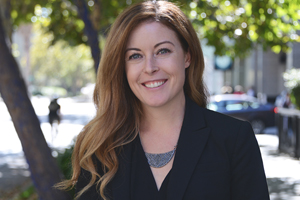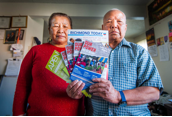When discussing climate adaptation, it is essential to address equity & climate justice. For a range of social, economic, and institutional reasons, certain groups of people and communities are more vulnerable to the impacts of climate change. These groups primarily include low-income communities, people of color, immigrants, and elderly populations.
Incorporating equity & climate justice into the climate change adaptation conversation was a key component of this year’s California Adaptation Forum. We have set up this section of our website to broaden the conversation by sharing what some climate change leaders are saying about equity & climate change, and by providing information and resources. We look forward to continuing the discussion with you for years to come.

 “The same things that contribute to climate change globally also drive poor health outcomes here in California, particularly in communities of color which are more likely to be located in close proximity to sources of pollution. We have a responsibility to address these issues in impacted communities first – that’s where problems around adaptation are toughest to solve, but where solutions will carry the greatest potential for change.”
“The same things that contribute to climate change globally also drive poor health outcomes here in California, particularly in communities of color which are more likely to be located in close proximity to sources of pollution. We have a responsibility to address these issues in impacted communities first – that’s where problems around adaptation are toughest to solve, but where solutions will carry the greatest potential for change.” “If we truly seek to build a socially, economically and environmentally sustainable future, we have to ensure that every part of our community is included in the solution, with particular emphasis on those that are often left out.”
“If we truly seek to build a socially, economically and environmentally sustainable future, we have to ensure that every part of our community is included in the solution, with particular emphasis on those that are often left out.” “SCOPE believes that climate policy and adaptation strategies should benefit those most directly impacted by climate change, environmental hazards, and chronic disinvestment. SCOPE is building a climate-conscious base of community members in South Los Angeles that are working to bring climate adaptation strategies, green job opportunities and direct investments to low-income communities of color.”
“SCOPE believes that climate policy and adaptation strategies should benefit those most directly impacted by climate change, environmental hazards, and chronic disinvestment. SCOPE is building a climate-conscious base of community members in South Los Angeles that are working to bring climate adaptation strategies, green job opportunities and direct investments to low-income communities of color.” “The Bay Area is facing an affordability and displacement crisis. Climate change will act as a threat multiplier on the very communities that are already struggling to stay in their homes, put food on the table and pay their bills. We will see water become more scarce and expensive, health disparities increase, low-lying homes flooded and food prices go up. Those who can least afford it will lose their homes and suffer most. Climate change may very well be the greatest equity challenge of our time.”
“The Bay Area is facing an affordability and displacement crisis. Climate change will act as a threat multiplier on the very communities that are already struggling to stay in their homes, put food on the table and pay their bills. We will see water become more scarce and expensive, health disparities increase, low-lying homes flooded and food prices go up. Those who can least afford it will lose their homes and suffer most. Climate change may very well be the greatest equity challenge of our time.” “All communities are not impacted equally by climate change. It is critical that adaptation planning, at the every level, include policies and resources that combat climate change impacts in the neighborhoods that need it most by reducing pollution, bringing more clean energy and increasing transit.”
“All communities are not impacted equally by climate change. It is critical that adaptation planning, at the every level, include policies and resources that combat climate change impacts in the neighborhoods that need it most by reducing pollution, bringing more clean energy and increasing transit.” “Social equity, civic engagement and community resiliency are inextricably linked. A community can truly be resilient only when it ensures that its efforts to adapt to climate impacts, security risks and economic consequences protect and benefit all of its residents especially lower-income neighborhoods, communities of color and those who have historically borne the greater burden of unhealthy pollution, environmental injustice and social disinvestment.”
“Social equity, civic engagement and community resiliency are inextricably linked. A community can truly be resilient only when it ensures that its efforts to adapt to climate impacts, security risks and economic consequences protect and benefit all of its residents especially lower-income neighborhoods, communities of color and those who have historically borne the greater burden of unhealthy pollution, environmental injustice and social disinvestment.” “We have to address the protection and restoration of the support systems for life on the planet and at the same time take into account people’s need for social and economic justice. These issues are interrelated. Both demand our attention and respect.”
“We have to address the protection and restoration of the support systems for life on the planet and at the same time take into account people’s need for social and economic justice. These issues are interrelated. Both demand our attention and respect.” “Equity should be a cornerstone for all of California’s climate policies. We need climate policies that reduce greenhouse gases and improve air quality in communities, and we need adaptation policies that focus on how helping low-income communities and communities of color adjust to changes that impact their everyday lives. Environmental justice communities across the state are fighting for cleaner air, more economic opportunities, and a healthier climate.”
“Equity should be a cornerstone for all of California’s climate policies. We need climate policies that reduce greenhouse gases and improve air quality in communities, and we need adaptation policies that focus on how helping low-income communities and communities of color adjust to changes that impact their everyday lives. Environmental justice communities across the state are fighting for cleaner air, more economic opportunities, and a healthier climate.” “With the Richmond Chevron Refinery in their backyards, our community leaders, Asian immigrants and refugees, have endured decades of pollution and they will be impacted first and worst by climate change. They are leading the way towards an equitable and just transition away from fossil fuels, and effective climate adaptation and resilience begins with recognizing the leadership of communities like Richmond, and including them in our vision for the future.”
“With the Richmond Chevron Refinery in their backyards, our community leaders, Asian immigrants and refugees, have endured decades of pollution and they will be impacted first and worst by climate change. They are leading the way towards an equitable and just transition away from fossil fuels, and effective climate adaptation and resilience begins with recognizing the leadership of communities like Richmond, and including them in our vision for the future.”
